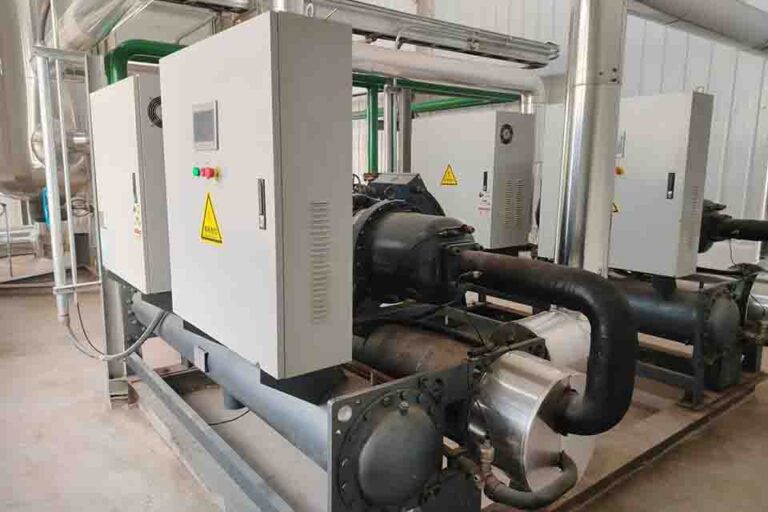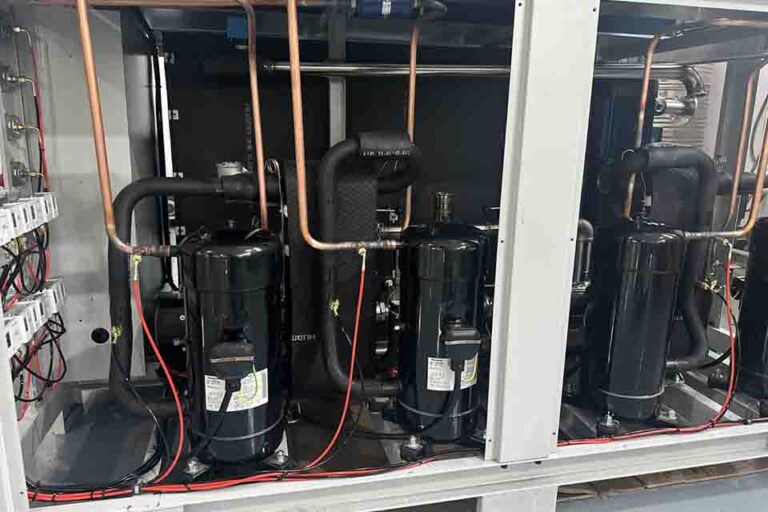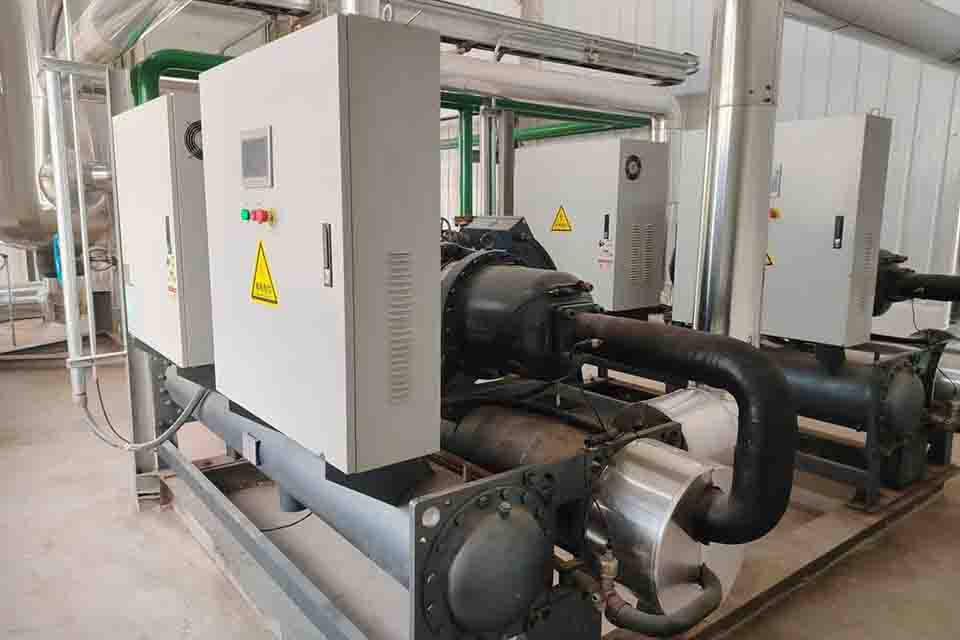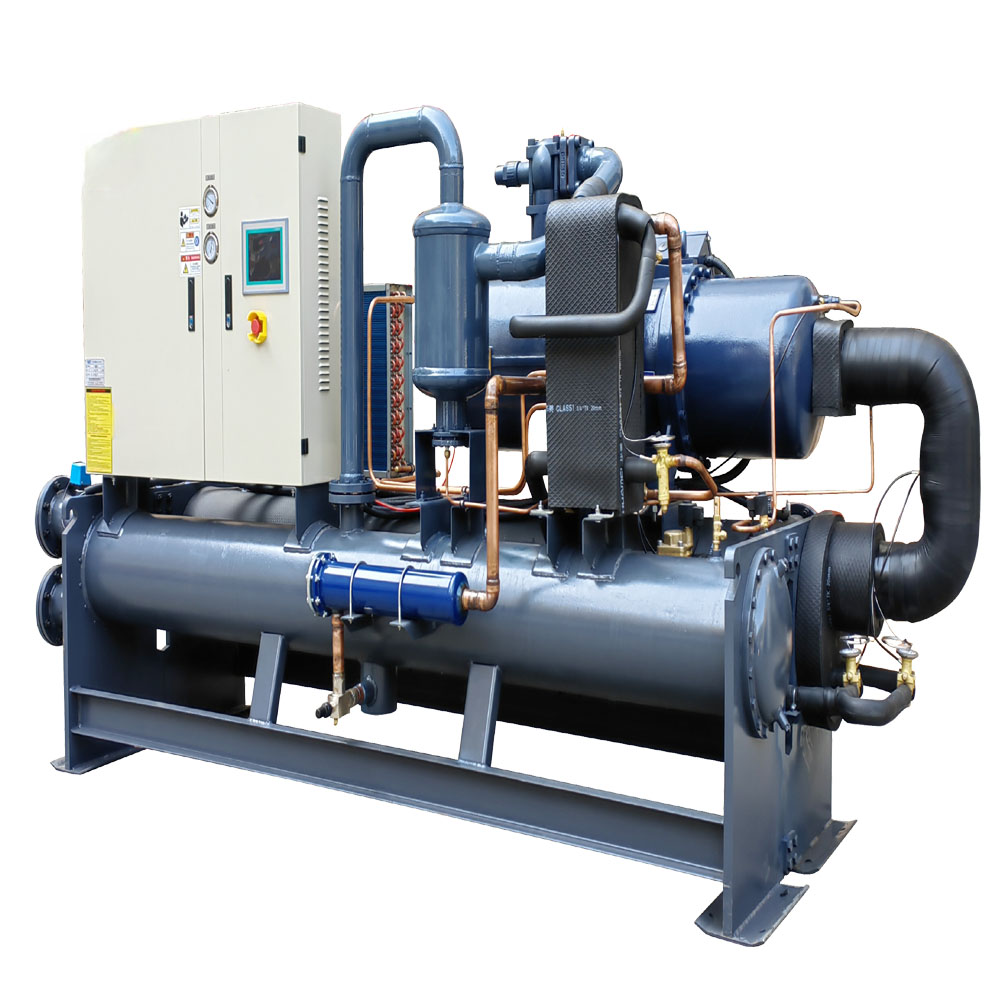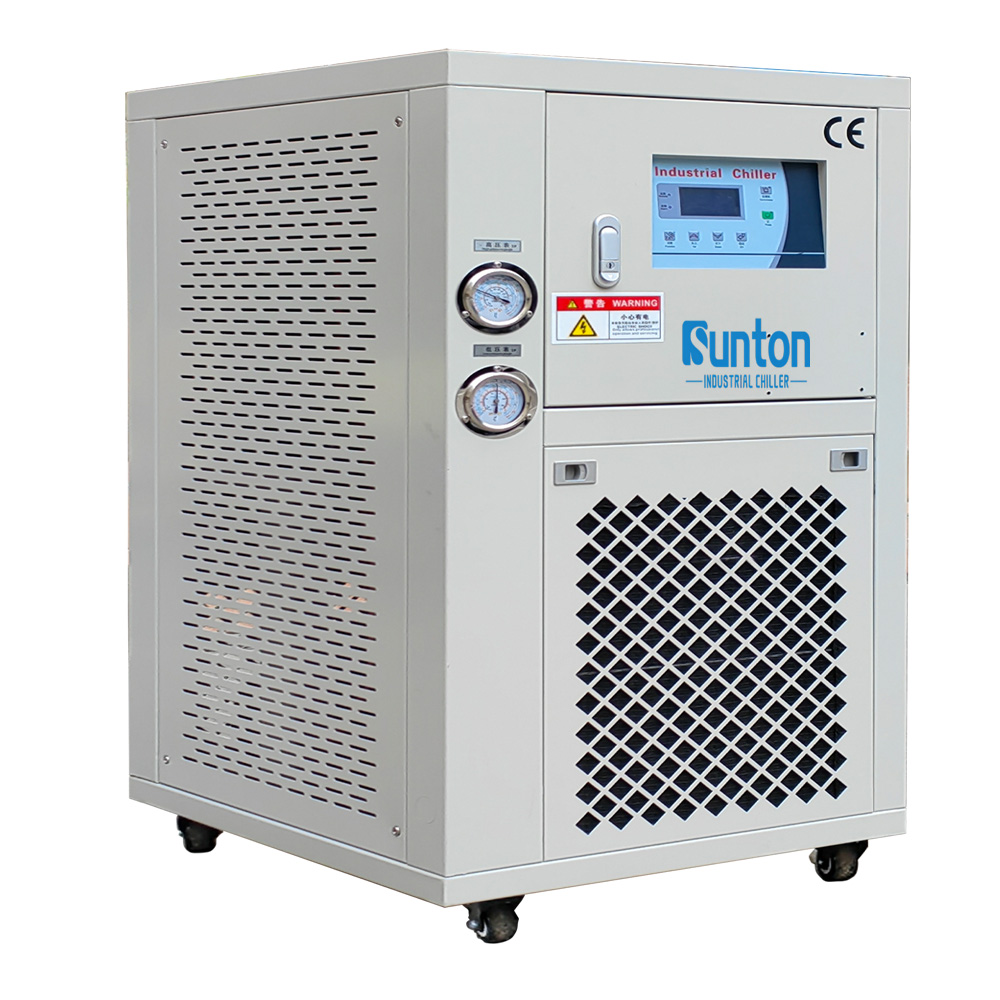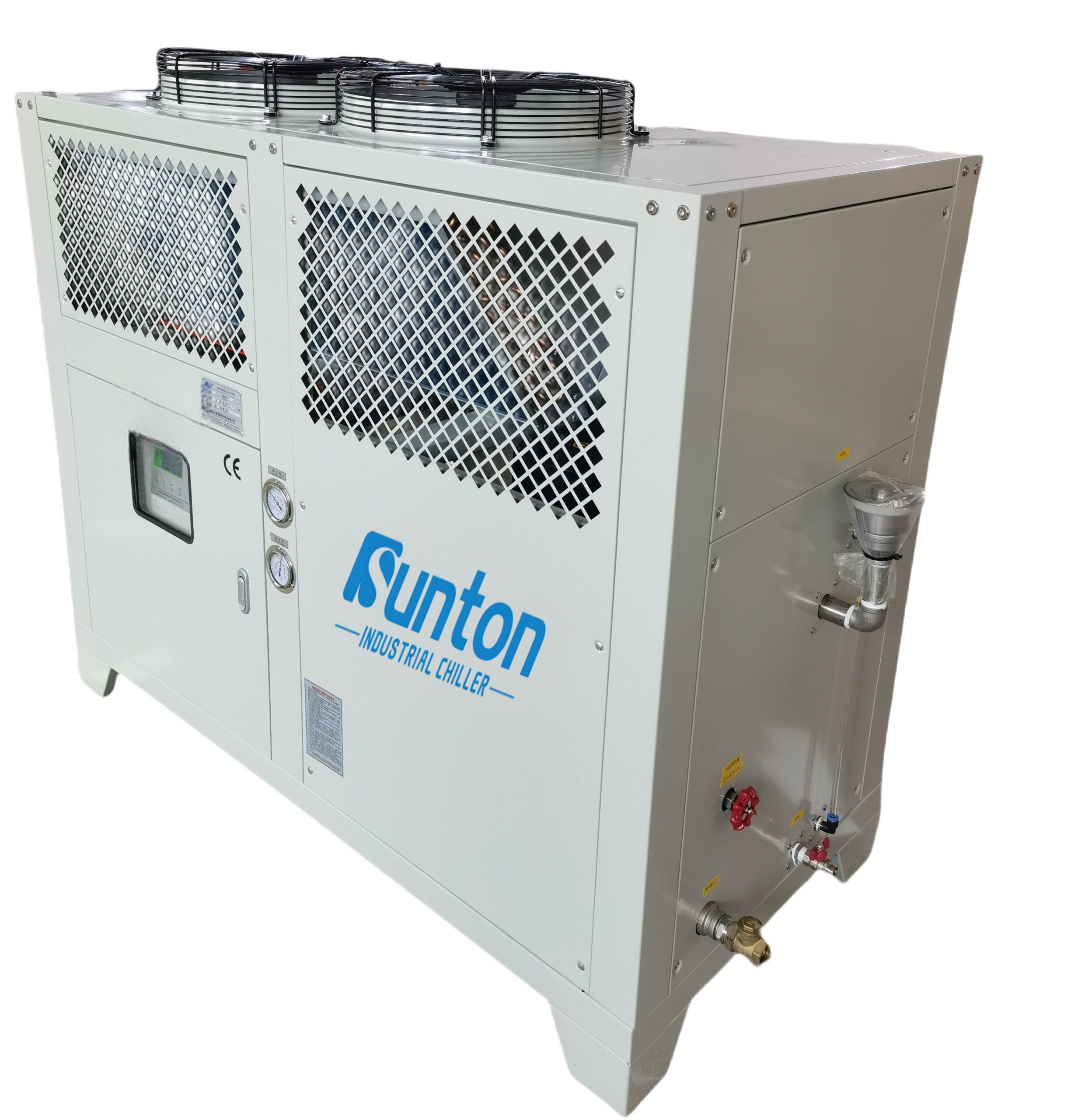-
Dalingshan Industrial Guangdong
Water Chillers For Textile Industry
Industrial Water Chillers: The Ultimate Cooling Solution for Manufacturing and Beyond
In today’s demanding industrial landscape, maintaining optimal temperatures is crucial for efficient operation, product quality, and worker comfort. Industrial water chillers are essential in maintaining thermal conditions in various The application of advanced technology can expand the capabilities of industrial water chillers.s. provide a powerful and reliable solution for a A wide range of Industrial water chillers are often used in mills to maintain a wide range of temperatures. is available for various applications, including garment production. of applications, from cooling Machinery used in the garment industry must be maintained for optimal performance. in In manufacturing, maintaining thermal conditions is essential for product quality. plants to regulating temperatures in HVAC systems. This comprehensive guide will delve into the world of An industrial water chiller is vital for ensuring efficient operation in garment manufacturing.s, exploring their diverse uses, key features, and the significant benefits they offer across various industries. Whether you’re looking to cool plastic injection molding machines, printing equipment, medical devices, or large commercial spaces, this article provides valuable insights into how industrial water chillers can optimize your operations and save you money. This article will explain how an industrial water cooled chiller can cool your facility.
Table of Contents
What is an Industrial Water Chiller and How Does it Work?
An industrial water chiller is a Refrigeration systems in mills require regular checks to maintain efficiency. system designed to remove heat from a process or facility by circulating cool water or a water/glycol mixture. The system uses a refrigerant to absorb heat. Unlike residential air conditioners that cool the air directly, industrial water chillers cool a liquid, which is then used to cool air, machinery, or other processes. This makes them ideal for applications requiring precise temperature control This system is ideal for environments where large amounts of ventilation are required. heat need to be dissipated. Industrial water chillers are designed for heavy-duty use and can handle the demanding cooling requirements of various industrial processes. Industrial water chillers can come in different configurations, such as those with a screw compressor. They are essential in creating a conducive working environment.
Industrial water chillers typically consist of four main components:
- Evaporator: Where the refrigerant absorbs heat from the water, causing it to cool.
- Compressor: Pumps the refrigerant throughout the system and compresses it, increasing its temperature and pressure.
- Condenser: Where the heat absorbed by the refrigerant is rejected, either to ambient air (air-cooled) or to a separate water loop (water-cooled).
- Expansion Valve: Regulates the flow of refrigerant and reduces its pressure before it enters the evaporator, completing the cycle. This allows for continuous cooling, making sure that industrial operations can continue without interruption.
Key Features of High-Performance Industrial Water Chillers
Modern industrial water chillers are designed with features that enhance performance, reliability, and efficiency. Here are some key features to look for:
- Precise electric volume measurement is essential in many applications. Temperature Control: Advanced industrial water chillers offer precise temperature control, often within a narrow range, which is critical for many manufacturing and industrial processes. For example, in plastic injection molding, maintaining a consistent mold temperature is essential for producing high-quality parts. Explore our Water Cooled Scroll Water Chiller options for precise control.
- Energy Efficiency: Energy efficiency is a crucial consideration for any business. Look for chillers with high Energy Efficiency Ratio (EER) and Seasonal Energy Efficiency Ratio (SEER) ratings. Features like variable-speed drives on compressors and fans can significantly reduce electricity consumption, leading to substantial energy savings.
- Robust Construction: Industrial water chillers must be built to withstand demanding operating conditions. Look for units with durable frames, corrosion-resistant materials, and high-quality components to ensure long-lasting performance and minimize downtime. They are designed to withstand harsh conditions and heavy use.
- Customization Options: Many manufacturers offer customizable chillers to meet specific application requirements. This may include features like specialized heat exchangers, redundant refrigeration circuits, or advanced control systems tailored to your process. Consider Anti-Explosion Chillers for hazardous environments.
- Remote Monitoring and Control: Advanced chillers often come with remote monitoring and control capabilities, allowing operators to track performance, adjust settings, and receive alerts from anywhere. This feature enhances operational efficiency and enables proactive maintenance.
Diverse Applications of Industrial Water Chillers
Industrial water chillers are used across a wide range of industries and applications, including:
- Plastics Industry: Chillers are essential for cooling molds in injection molding, blow molding, and extrusion processes, ensuring product quality and faster cycle times. A chiller system used in a plastics facility helps keep the machine operating at the right temperature.
- Metalworking: Chillers are used to cool cutting fluids, lasers, and other machinery used in metalworking, preventing overheating and extending tool life.
- Printing: Chillers maintain consistent temperatures in printing presses, ensuring ink viscosity and print quality.
- Medical Devices: Chillers provide precise temperature control for medical imaging equipment like MRI and CT scanners, as well as for laboratory equipment and pharmaceutical processes.
- Food and Beverage: Chillers are used in various food and beverage processing applications, including cooling ingredients, fermentation tanks, bakery ovens, and pasteurization processes. A food processing chiller will help keep your food and beverage products at the right temperature.
- HVAC Systems: Chillers are a critical component of many large HVAC systems, providing cooling for office buildings, hospitals, supermarkets, hypermarkets, and other commercial spaces. They will help maintain a comfortable environment.
The Importance of Temperature Control in Manufacturing
Precise temperature control is not just about comfort; it’s a critical factor in ensuring product quality, process efficiency, and equipment longevity in various manufacturing processes. Here’s why:
- Product Quality: In many manufacturing processes, such as plastic molding, metal casting, and chemical processing, temperature fluctuations can lead to defects, inconsistencies, and reduced product quality. Industrial water chillers help maintain the optimal temperature throughout the process, ensuring consistent and high-quality output.
- Process Efficiency: Maintaining the correct temperature can significantly impact the efficiency of a manufacturing process. For example, in plastic injection molding, properly cooled molds allow for faster cycle times, increasing productivity.
- Equipment Longevity: Excessive heat can damage machinery and shorten its lifespan. Industrial water chillers help dissipate heat from equipment, reducing wear and tear and extending its operational life. Proper cooling can reduce the risk of breakdowns and expensive repairs.
- Safety: In some manufacturing processes, particularly those involving chemical reactions, precise temperature control is crucial for safety. Chillers help prevent overheating and potential hazards, such as fires or explosions.
Enhancing Efficiency and Reducing Costs with Industrial Water Chillers
Investing in a high-efficiency industrial water chiller can yield significant long-term benefits for your business:
- Energy Savings: Modern chillers with advanced technology, such as variable-speed drives and optimized refrigeration cycles, can significantly reduce energy costs compared to older, less efficient models. By minimizing electricity consumption, you can lower your operating expenses and improve your bottom line. Consider our Air Cooled Screw Chiller for an energy-saving solution.
- Reduced Maintenance Costs: High-quality chillers designed for industrial use are built to last, with durable components and robust construction. This translates to less frequent breakdowns, reduced downtime, and lower maintenance costs over the chiller’s lifespan.
- Increased Productivity: By maintaining optimal temperatures, industrial water chillers can help optimize manufacturing processes, leading to faster cycle times, reduced scrap rates, and increased productivity. This is especially important for industries that rely on continuous production.
- Environmental Benefits: Energy-efficient chillers not only save money but also reduce your environmental impact by lowering your carbon footprint. Many newer chiller models use refrigerants with lower global warming potential, further reducing their environmental footprint.
Choosing the Right Industrial Water Chiller for Your Needs
Selecting the right industrial water chiller for your facility requires careful consideration of several factors:
- Cooling Capacity: Determine the required cooling capacity based on the heat load of your process or equipment. This involves calculating the amount of heat that needs to be removed per unit of time. Consider factors like the size of the machine or process, the materials being processed, and the desired cycle times.
- Temperature Requirements: Identify the specific temperature range needed for your application. Some processes require very low temperatures, while others need moderate cooling. Chillers are available with varying temperature capabilities, so it’s crucial to choose one that meets your needs.
- Water-Cooled vs. Air-Cooled: Decide whether a water-cooled or air-cooled chiller is more suitable for your facility. Water-cooled chillers are generally more efficient but require a source of cooling water, such as a cooling tower. Air-cooled chillers are easier to install but may be less efficient in hot climates. Explore our Water Cooled Screw Central Chillers for water-cooled options.
- Footprint and Space Constraints: Consider the available space in your facility and choose a chiller with an appropriate footprint. Some chiller models are designed for compact installation, while others may require more space.
- Redundancy: For critical applications where downtime is unacceptable, consider a system with redundant components, such as dual compressors or pumps, to ensure continuous The system ensures operation even if one electric component fails, enhancing reliability.
Installation and Maintenance of Industrial Water Chiller Systems
Proper installation and maintenance are essential for ensuring the long-term performance, efficiency, and reliability of your industrial water chiller system.
- Professional Installation: It’s crucial to have your chiller system installed by qualified technicians with experience in industrial refrigeration. They will ensure that the chiller is properly sized, piped, wired, and charged with refrigerant according to the manufacturer’s specifications and industry best practices.
- Regular Maintenance: Implement a preventative maintenance program that includes regular inspections, cleaning, and servicing of the chiller and its components. This should include tasks such as:
- Checking refrigerant levels and pressures
- Inspecting and cleaning heat exchangers
- Testing and calibrating controls
- Lubricating moving parts
- Checking for leaks
- Water Treatment: If you’re using a water-cooled chiller, it’s essential to maintain proper water quality in the cooling tower or other water source. This involves treating the water to prevent scaling, corrosion, and biological growth, which can reduce efficiency and damage the equipment.
- Record Keeping: Maintain detailed records of all maintenance activities, including inspections, repairs, and refrigerant charges. This will help you track the chiller’s performance over time, identify recurring issues, and ensure compliance with environmental regulations.
Environmental Considerations for Industrial Water Chillers
Industrial water chillers can have significant environmental impacts, primarily related to energy consumption and refrigerant emissions. Here are some key considerations:
- Energy Efficiency: Choosing an energy-efficient chiller is crucial for minimizing your facility’s carbon footprint. Look for chillers with high EER and SEER ratings, and consider features like variable-speed drives to optimize energy use.
- Refrigerant Choice: Many older chillers use refrigerants with high global warming potential (GWP). When selecting a new chiller, opt for models that use refrigerants with low or zero GWP to reduce the environmental impact.
- Water Conservation: If you’re using a water-cooled chiller, consider implementing measures to reduce water consumption, such as using recycled water in the cooling tower or optimizing the cooling tower’s operation to minimize evaporation and blowdown.
- Noise Pollution: Some chillers, particularly air-cooled models, can generate significant noise. Choose chiller models with low-noise designs, and consider noise attenuation measures if noise is a concern in your facility or surrounding areas. Consider our Glycol chillers as a quieter alternative.
Customization Options for Industrial Water Chillers
While standard industrial water chillers meet the needs of many applications, some facilities or processes require customized solutions. Here are some common customization options:
- Temperature Range: Chillers can be designed to operate within specific temperature ranges, from very low temperatures for specialized processes to higher temperatures for comfort cooling.
- Cooling Capacity: Chillers are available in a wide range of cooling capacities, from small units for individual machines to large, centralized systems for entire plants.
- Redundancy: For critical applications where downtime is unacceptable, chillers can be configured with redundant components, such as dual compressors, pumps, or refrigeration circuits, to ensure continuous operation.
- Control Systems: Advanced control systems can be integrated into the chiller to provide precise temperature control, remote monitoring, and data logging capabilities. These systems can also be customized to interface with your facility’s building management system (BMS) or other control platforms.
- Specialized Heat Exchangers: Depending on your specific application, you may require specialized heat exchangers, such as those designed for use with corrosive fluids or high-viscosity liquids.
- Materials of Construction: Chillers can be constructed with various materials to withstand harsh environments or corrosive substances. For example, stainless steel construction may be required for food processing applications where hygiene is critical.
Future Trends in Industrial Water Chiller Technology
The field of industrial water chillers is continually evolving, with ongoing advancements in technology aimed at improving efficiency, reducing environmental impact, and enhancing performance. Here are some key trends to watch:
- Low-GWP Refrigerants: The industry is transitioning to refrigerants with lower global warming potential, driven by regulations and increasing environmental awareness.
- Magnetic Bearing Compressors: Magnetic bearing compressors, which use magnetic fields to levitate the compressor shaft, are gaining popularity due to their high efficiency, reduced maintenance, and quiet operation.
- Smart Controls and IoT Integration: Chillers are becoming increasingly intelligent, with advanced control systems that use real-time data and predictive analytics to optimize performance, detect potential issues, and integrate with the Internet of Things (IoT).
- Modular Chillers: Modular chiller systems, which consist of multiple smaller chiller units that can be staged on or off based on demand, are gaining traction due to their flexibility, scalability, and energy efficiency.
- Absorption Chillers: Absorption chillers, which use a heat source instead of electricity to drive the refrigeration cycle, are seeing renewed interest, particularly in applications where waste heat is available.
FAQs
What is the difference between an air-cooled and a water-cooled chiller?
Air-cooled chillers use ambient air to reject heat from the refrigerant, while water-cooled chillers use water, typically from a cooling tower, to absorb and dissipate the heat. Water-cooled chillers are generally more efficient but require a water source and additional plumbing.
How often should an industrial water chiller be serviced?
An industrial water chiller should be inspected and serviced at least annually by a qualified technician. More frequent maintenance may be needed depending on the specific application, operating conditions, and manufacturer recommendations.
What size chiller do I need for my application?
The appropriate chiller size depends on the heat load of your process or facility, the required temperature differential, and other factors. It’s best to consult with a chiller expert to determine the correct size for your needs.
Can an industrial water chiller be used for both process cooling Proper ventilation is key to ensuring comfort in industrial settings. cooling?
Yes, an industrial water chiller can be used for both process cooling and comfort cooling (HVAC) applications. However, the specific design and configuration may vary depending on the application.
What are the advantages of using a glycol mixture in a chiller system?
Adding glycol to the water in a chiller system lowers the freezing point of the mixture, allowing for lower operating temperatures without the risk of freezing. Glycol also helps to prevent corrosion within the system.
How can I improve the energy efficiency of my chiller system?
You can improve energy efficiency by selecting a chiller with a high EER and SEER rating, using variable-speed drives on compressors and pumps, optimizing the chiller’s operating parameters, and performing regular maintenance.
Conclusion
- Precise Temperature Control: Industrial water chillers provide precise temperature control for a wide range of applications, from manufacturing processes to HVAC systems.
- Enhanced Efficiency: Modern chillers are designed for energy efficiencyThese systems, helping businesses in the garment sector, ensure consistent temperature control. reduce operating costs and minimize their environmental impact.
- Reliable Performance: Industrial water chillers are built to withstand demanding operating conditions, providing reliable performance and minimizing downtime.
- Customization Options: Chillers can be customized to meet the specific needs of different applications, including specialized temperature ranges, cooling capacities, and control features.
- Expert Support: Choosing the right chiller and maintaining it properly requires specialized knowledge. Partnering with an experienced chiller supplier ensures you get the best solution for your needs and ongoing support.
By investing in a high-quality industrial water chiller and implementing best practices for operation and maintenance, businesses can optimize their processes, improve product quality, enhance worker comfort, and reduce operating costs. As technology continues to advance, industrial water chillers will play an increasingly important role in a wide range of industries, helping businesses achieve their goals while minimizing their impact on the environment.

